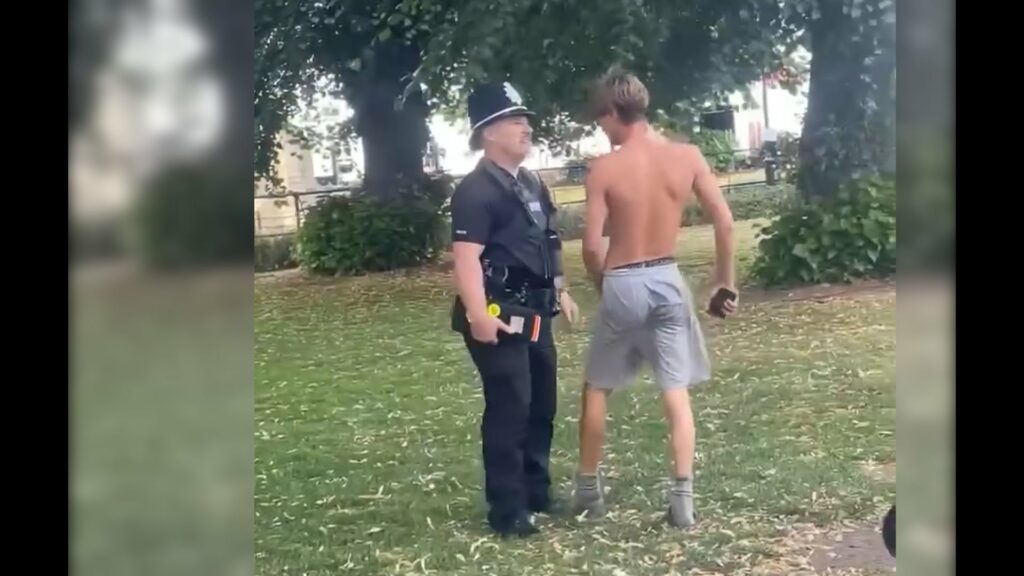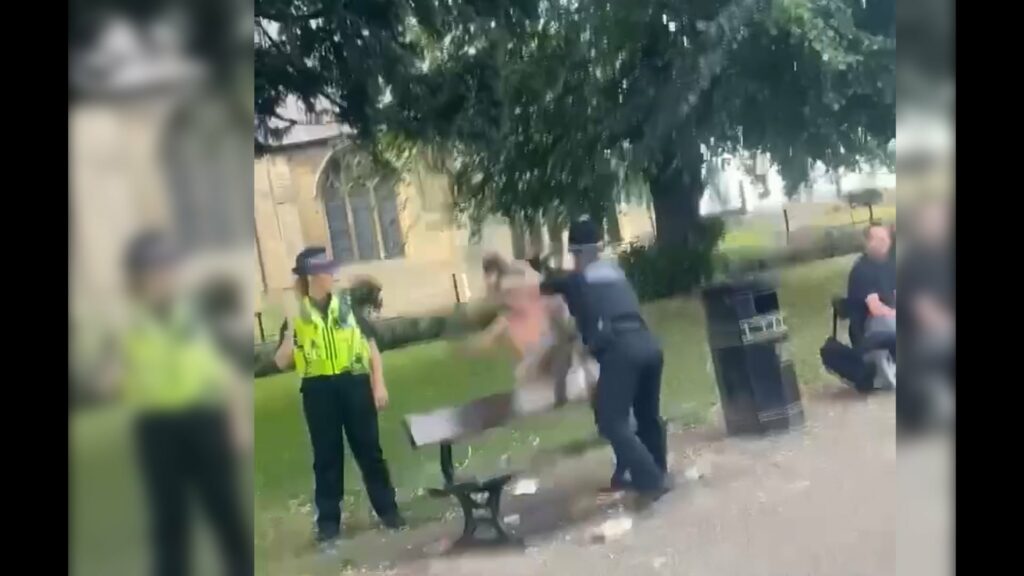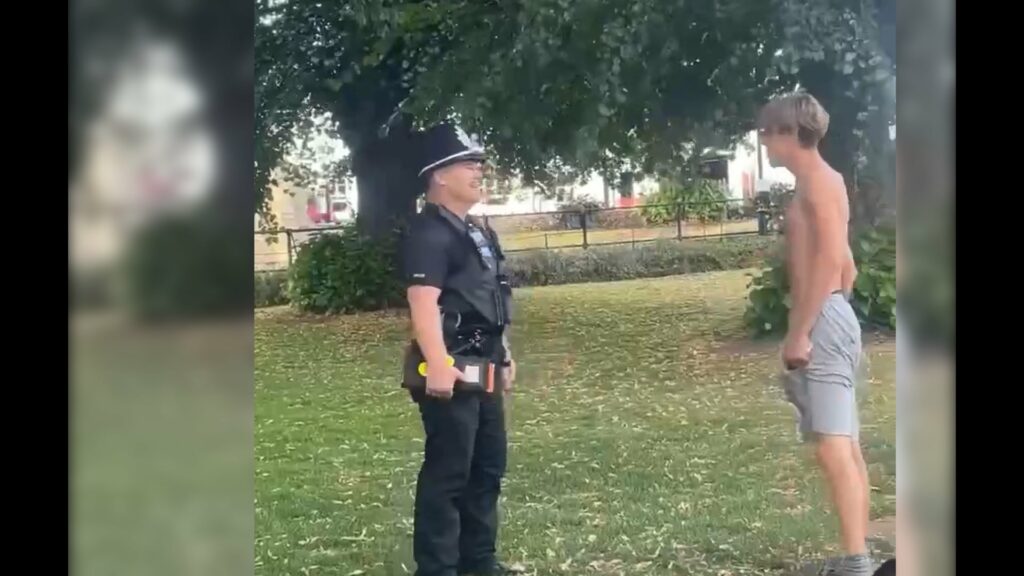A Cambridgeshire police who was acquitted of assaulting a man in Wisbech has been given a final written warning after a misconduct hearing concluded that his behaviour fell below the standards expected of the police service.
The hearing, which took place at Lysander House, Tempsford, on 4 November 2025, found that PC Dean Thompson, based in Fenland, had breached the Standards of Professional Behaviour in relation to authority, respect and courtesy, use of force, and discreditable conduct.
The incident in question occurred on 9 August 2024 at St Peter’s Church and Gardens, Wisbech, where PC Thompson and colleague PC Rachael Copeland approached a group of men as part of an operation targeting anti-social behaviour.
According to the findings read out at the hearing, “PC Thompson has remonstrated with a man known to be Harvey Bird, making comments to Bird such as ‘name a place mate, come on, name a place’ and calling Bird a ‘pussy’.”

The panel heard that the officer then “turned his attention to the complainant, Jack Sanderson, who was sitting on the top of the back panel of a park bench,” and that after an exchange of words, “PC Thompson has stated, ‘If you want a go mate, let me know.’
PC Thompson has stood in close proximity to Sanderson and has forcefully pushed him to his chest causing Sanderson to fall back from the bench onto his back onto the ground.”
The incident was captured on a mobile phone and the footage later circulated on social media before being submitted to police.
Court case and acquittal
The misconduct panel acknowledged that criminal proceedings had already taken place.
The hearing record stated: “PC Thompson was charged with the offence of assault by beating.
At the first hearing, PC Thompson pleaded not guilty to the offence citing self-defence. The matter went to trial on 8 August 2025 at Stevenage Magistrates’ Court… PC Dean Thompson was acquitted of assaulting Jack Sanderson following a trial.”
The court accepted that the officer believed he was under threat and had acted in self-defence when he used a “trained, open-palm technique” to push Sanderson away.
However, despite the acquittal, the internal disciplinary process found that the officer’s overall behaviour still breached professional standards.
Hearing findings
Chief Constable Simon Megicks, who chaired the hearing, said in his decision: “There is no doubt that PC Thompson’s behaviour this day fell short of the standards we expect as a police force.
“However, I do accept that his actions were in pursuit of public good. I have determined that a final written warning, lasting five years, alongside a restriction on his working location, is an appropriate and proportionate outcome to maintain public confidence.”

Outlining the findings, he said: “The facts alleged are disputed and I find them proved as alleged by the Appropriate Authority. I find that the facts found proved are a breach of the standard of professional behaviour in that PC Thompson acted with discreditable conduct, authority, respect and courtesy and the use of force was disproportionate.”
Chief Constable Megicks said the video footage had been an important factor: “The video which was shared on social media shows the interaction – although I accept not the entire incident – but does show the moment prior to the officer engaging with Sanderson, whom he did not know prior to this incident.
“Whilst it is clear there was history between him and Mr Bird, by his own account, he did not know of Sanderson.”
The hearing record noted that the officer’s body-worn video camera was not turned on at the time.
The Chief Constable remarked: “It would have been of assistance to me in understanding the entire picture if I had the ability to review the BWV. It was disappointing that neither of the officers that day had turned on their BWV’s contrary to guidance.”
Language and conduct
The chair said the language used by the officer at the scene was “unacceptable,” adding: “The language used, he accepts amounts to misconduct, in my opinion gross misconduct.
“I do not accept that this is appropriate use of language against anyone and also do not accept his account that this is justified on the basis that it is the manner in which the youth speak.”

He said the officer’s words would have been audible to others nearby: “PC Thompson’s language would have been audible to others in the vicinity. He was clearly aware this was inappropriate language as he himself threatened Sanderson with a public order arrest on the basis of his language, which was similar.”
Referring to the push that caused Sanderson to fall, the hearing concluded that the use of force was pre-emptive and excessive.
The chair said: “PC Thompson approached Sanderson, and he was sitting on the top of a bench at the time PC Thompson approached him. This would mean that he had no way of breaking his fall upon being pushed backwards.”
He cited the evidence of PC Copeland, who had been on patrol with Thompson:
“In her view she states, ‘I knew that force used was hard and appeared excessive and disproportionate.’ She is seen on the video trying to manage the situation and assist PC Thompson.”
Failure to de-escalate
The hearing found that rather than calming the situation, the officer’s actions had aggravated it.
The decision said: “The video shows that as opposed to de-escalating, PC Thompson was continuing the provocation by not only his use of language, which he accepts was misconduct (the use of the word pussy is unacceptable in a public place undermining the officer’s ability to police public order offences) and I do not accept his definition of the word relates to cowardice rather than the plain English language – in a derogatory and provocative manner.”

The hearing concluded that the officer’s conduct “significantly undermined public trust.”
“Public trust and confidence in policing has over the last number of years been significantly eroded and it is therefore ever more essential that police officers behave in accordance with the standards expected of them, when in public officers are continually judged, and in this case recorded, therefore need to be alive to the implications of their behaviours both at the time and subsequently to the event.”
Consideration of personal circumstances
Chief Constable Megicks said he had taken into account evidence about the officer’s mental health and long service record.
“The impact of PC Thompson’s PTSD on his reaction to Sanderson on the date in question is something I have considered in detail and can confirm that whilst there is no evidence from either him or the Appropriate Authority of his PTSD, I accept his evidence that he suffers with it and it affected him.”
He continued: “He has made a contribution to the police service over 27 years and prior to that served in the fire service.”
The hearing accepted that the officer’s reaction may have been influenced by prior encounters with individuals in the area:
“I remind myself that this is confined to a single episode of a brief duration. I accept and this has been crucial to my finding, that PC Thompson had history with some of the young people involved in the incident and that as a consequence his reaction was heightened.”
The Chief Constable acknowledged an element of provocation: “I accept that a mitigating factor is the element of provocation, threat or disturbance that may have affected the officer’s judgement in the use of force in the heat of the moment.”
However, he said that this did not excuse the conduct.
“I know that he was acting in pursuance of a legitimate policing purpose in that looking to address ASB – however his own behaviour seemed to perpetuate the behaviours the PC Thompson was addressing.”
Weighing the outcome
In reaching his final decision, the Chief Constable said he had considered the range of possible sanctions available under the Police (Conduct) Regulations.
“The outcomes I have considered are a written warning, final written warning, reduction in rank and dismissal without notice.”
He noted that if the incident had taken place after new amendments to the regulations came into force in 2025, the presumption would have been dismissal without notice.
“The misconduct occurred prior to the new amendments coming into force in 2025 which would mean that the effect would now be – if this happened after the commencement – the disciplinary action imposed must be dismissal without notice, unless I am satisfied that there are exceptional circumstances which justify a final written warning.”
The chair said that even if the new rules applied, he would have found exceptional circumstances.
“However, my view is that if I were applying the test, as explained below, given the particular circumstances of PC Thompson’s case, I would have found that special circumstances existed.”
He said that, while the misconduct was serious, dismissal was not necessary to uphold public confidence: “My decision is therefore whilst I am mindful of the conduct on the reputation of the public confidence in the Police, I do find that there are certain circumstances in this case that would permit me to find that a lesser sanction than an immediate dismissal would be sufficient to maintain public confidence.”
The Chief Constable set out those circumstances in detail: “There was previous history between members of the group and PC Thompson, and it is clear PC Thompson was provoked in a known area of anti-social behaviour.
“I accept PC Thompson reacted in a manner which was heightened by the circumstances he found himself in. I accept his oral evidence that he felt isolated given his condition which I accept he was suffering from. I accept his actions were in pursuit of public good, although accept his behaviour fell short of the standards expected.”
Final decision
The panel imposed the maximum sanction short of dismissal.
“The outcome shall be a final written warning for a duration of five years, which is the maximum reflecting the seriousness of the misconduct. In addition to this, I apply a condition of a restriction on the working location for PC Thompson in that he is not to work in Fenland district area (subject to his medical conditions).”
Chief Constable Megicks concluded: “This outcome most appropriately fulfils the purpose of imposing sanctions in police misconduct proceedings. I have considered less severe outcomes before more severe outcomes in making my decision.”
He emphasised that the aim of the decision was to maintain confidence in policing while recognising the context of the incident.
The officer retains the right to appeal to the Police Appeals Tribunal within ten working days.
The full findings and outcome of the Accelerated Misconduct Hearing for PC 1676 Dean Thompson have been published on the Cambridgeshire Constabulary website.

















